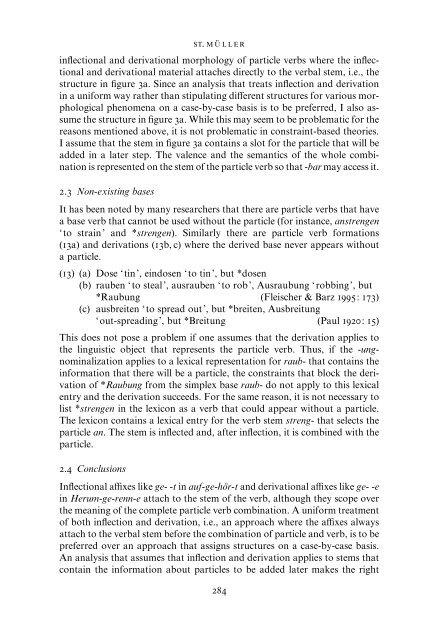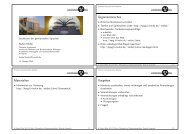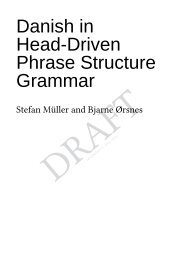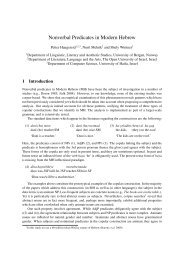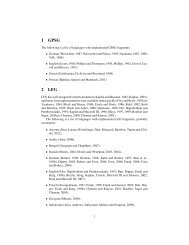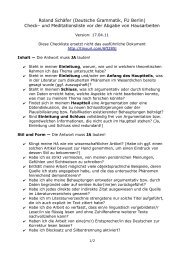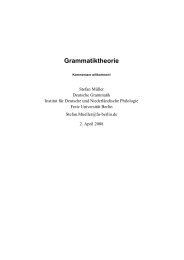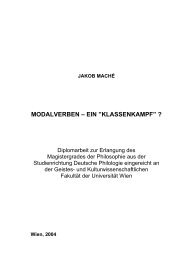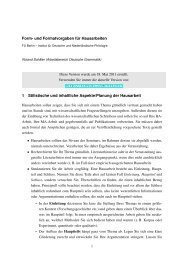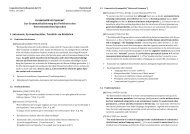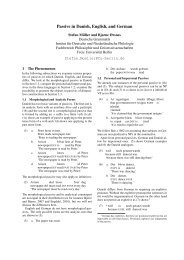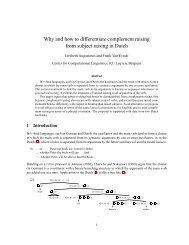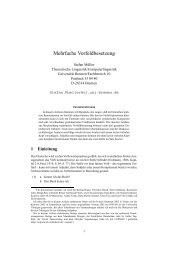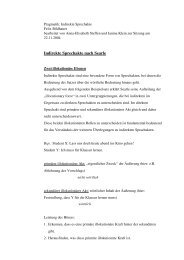Solving the bracketing paradox - German Grammar Group FU Berlin
Solving the bracketing paradox - German Grammar Group FU Berlin
Solving the bracketing paradox - German Grammar Group FU Berlin
You also want an ePaper? Increase the reach of your titles
YUMPU automatically turns print PDFs into web optimized ePapers that Google loves.
ST. MÜLLER<br />
inflectional and derivational morphology of particle verbs where <strong>the</strong> inflectional<br />
and derivational material attaches directly to <strong>the</strong> verbal stem, i.e., <strong>the</strong><br />
structure in figure 3a. Since an analysis that treats inflection and derivation<br />
in a uniform way ra<strong>the</strong>r than stipulating different structures for various morphological<br />
phenomena on a case-by-case basis is to be preferred, I also assume<br />
<strong>the</strong> structure in figure 3a. While this may seem to be problematic for <strong>the</strong><br />
reasons mentioned above, it is not problematic in constraint-based <strong>the</strong>ories.<br />
I assume that <strong>the</strong> stem in figure 3a contains a slot for <strong>the</strong> particle that will be<br />
added in a later step. The valence and <strong>the</strong> semantics of <strong>the</strong> whole combination<br />
is represented on <strong>the</strong> stem of <strong>the</strong> particle verb so that -bar may access it.<br />
2.3 Non-existing bases<br />
It has been noted by many researchers that <strong>the</strong>re are particle verbs that have<br />
a base verb that cannot be used without <strong>the</strong> particle (for instance, anstrengen<br />
‘to strain’ and *strengen). Similarly <strong>the</strong>re are particle verb formations<br />
(13a) and derivations (13b, c) where <strong>the</strong> derived base never appears without<br />
a particle.<br />
(13) (a) Dose ‘tin’, eindosen ‘to tin’, but *dosen<br />
(b) rauben ‘to steal’, ausrauben ‘to rob’, Ausraubung ‘robbing’, but<br />
*Raubung (Fleischer & Barz 1995: 173)<br />
(c) ausbreiten ‘to spread out’, but *breiten, Ausbreitung<br />
‘out-spreading’, but *Breitung (Paul 1920: 15)<br />
This does not pose a problem if one assumes that <strong>the</strong> derivation applies to<br />
<strong>the</strong> linguistic object that represents <strong>the</strong> particle verb. Thus, if <strong>the</strong> -ungnominalization<br />
applies to a lexical representation for raub- that contains <strong>the</strong><br />
information that <strong>the</strong>re will be a particle, <strong>the</strong> constraints that block <strong>the</strong> derivation<br />
of *Raubung from <strong>the</strong> simplex base raub- do not apply to this lexical<br />
entry and <strong>the</strong> derivation succeeds. For <strong>the</strong> same reason, it is not necessary to<br />
list *strengen in <strong>the</strong> lexicon as a verb that could appear without a particle.<br />
The lexicon contains a lexical entry for <strong>the</strong> verb stem streng- that selects <strong>the</strong><br />
particle an. The stem is inflected and, after inflection, it is combined with <strong>the</strong><br />
particle.<br />
2.4 Conclusions<br />
Inflectional affixes like ge- -t in auf-ge-hör-t and derivational affixes like ge--e<br />
in Herum-ge-renn-e attach to <strong>the</strong> stem of <strong>the</strong> verb, although <strong>the</strong>y scope over<br />
<strong>the</strong> meaning of <strong>the</strong> complete particle verb combination. A uniform treatment<br />
of both inflection and derivation, i.e., an approach where <strong>the</strong> affixes always<br />
attach to <strong>the</strong> verbal stem before <strong>the</strong> combination of particle and verb, is to be<br />
preferred over an approach that assigns structures on a case-by-case basis.<br />
An analysis that assumes that inflection and derivation applies to stems that<br />
contain <strong>the</strong> information about particles to be added later makes <strong>the</strong> right<br />
284


